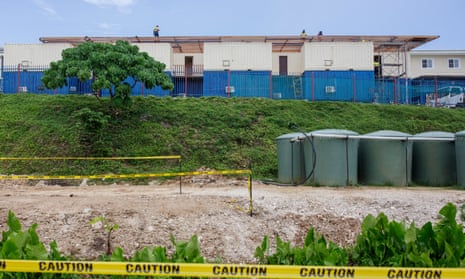Security contractor Paladin has broken its silence to attack suggestions of corruption as “offensive”, while rejecting reports linking it to a series of bad debts or failed contracts across Asia.
The firm said it is seeking legal advice about media articles it said had “failed to identify any evidence to sustain the damaging allegations being made against Paladin”.
“We do not have any bad debts or failed contracts,” the company said. “We do not make payments that are not linked to a service. We reject the notion in the media that any contract with a Papua New Guinea (PNG) entity is tainted by corruption – we find this notion offensive.”
The Department of Home Affairs has attracted significant scrutiny for awarding Paladin, a small and relatively unknown firm, a series of contracts worth $423m to provide services to asylum seekers on Manus Island.
Paladin has, until now, largely declined to respond to media queries, saying: “Paladin are not in a position to comment publicly on any matters relating to our work on behalf of the Australian government in Papua New Guinea however, I encourage you to direct any further queries to the Department of Home Affairs.”
But the company released a statement on Thursday that lashed “unsubstantiated” reporting about its business.
Much of the criticism has focussed on a subsidiary of Paladin being registered to a beach shack on Kangaroo Island. But the firm said it performs no service delivery work in Australia and “as such had been registered at a private residential address”.
“This address has now been changed to a serviced office in Canberra,” the firm said.
Paladin also rejected allegations that alleged its founder, Craig Thrupp, had left a “string of bad debts and failed contracts across Asia”, which were reported by the Australian Financial Review.
“This article has failed to identify any evidence to sustain the damaging allegations being made against Paladin,” the company said. “Paladin considers these are unsubstantiated allegations and we are seeking legal advice on our options for a full retraction and correction of the article, including re-reporting by other agencies.”
It said the allegations about bad debts and failed contracts appeared to mix up two businesses with similar names and said there was “confusion in the media around these unrelated entities and any potential bad debts and failed contracts that may be attributed to them”.
Paladin also rejected allegations that the Papua New Guinea parliamentary Speaker, Job Pomat, had benefited in any way from its business dealings, either through the firm itself, its subcontractors, or partners.
“We recognise the Speaker as a man of absolute integrity, a leader of his people and a respected clan leader in Manus Province,” the company said.
The Paladin affair has continued to prompt scrutiny and outrage this week, both in PNG and Australia. The PNG prime minister, Peter O’Neill, has demanded a “full briefing” on the issue and encouraged Australia to hold an investigation. The former PM, Mekere Mourata, said Australia should at least explain why its procurement processes had failed so badly.
The Department of Home Affairs has previously faced criticism for the handling of its offshore contracts. An auditor general report previously found its management of the contracts fell short of procurement standards.
A second contractor, Canstruct, was also handed a major offshore contract on Nauru in similar circumstances. The tender was limited to a single bidder and Canstruct had limited experience running garrison and welfare services in immigration detention.
